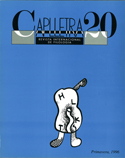El canvi lingüístic i els conflictes de la naturalitat: les desinències del present de subjuntiu
DOI:
https://doi.org/10.7203/caplletra.20.7353Keywords:
canvi lingüístic, conflicte, present de subjuntiu, desinència de primera persona Abstract
Abstract
I trace here the evolution of present subjunctive markers in Catalan and, in general, in those Romance languages where the fall of final unstressed vowels allows exemplification of the tendencies toward morphological optimization, as well as some of the naturalness conflicts produced among the different tendencies. The morphological tendencies which appear most active when it comes to a developmental explanation are, in this order, iconicity, transparency, and universality. I also analyze the etymology of the different markers and the three different types of innovations; specifically: (i) the morphologization of vocalic segments which originally had merely a phonological value; (ii) analogical generalization in the first conjugation of the affix characteristic of. the second and third conjugations; and (iii) the reanalysis of segments belonging to the end of the root or to the root extension of some verbs of conjugations other than the first.
 Downloads
Downloads
Downloads
Published
How to Cite
-
Abstract509
-
PDF (Català)161
Issue
Section
License
Authors submitting work to Caplletra for publication must be the legitimate holder of the usage rights. Legitimacy for the purposes of publishing the work must also include images, tables, diagrams and any other materials that may complement the text, whether they are the author of such material or not.
Copyright: on publishing their work in the journal, the author grants Caplletra. Revista Internacional de Filologia usage rights (reproduction, distribution and public communication) for both the paper printed version and for the electronic version.
All work published in Caplletra is covered by the Creative Commons license type Attribution-NonCommercial-NoDerivatives 4.0 (CC BY-NC-ND 4.0).
RESPONSABILITY
Caplletra. Revista Internacional de Filologia does not necessarily identify with the points of view expressed in the papers it publishes.
Caplletra. Revista Internacional de Filologia accepts no responsibility whatsoever for any eventual infringement of intellectual property rights on the part of authors.






